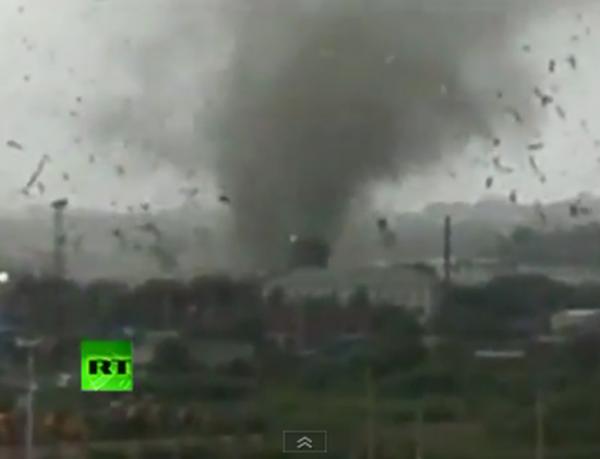
Rare, Powerful Tornado Hits Russian City

Get the world’s most fascinating discoveries delivered straight to your inbox.
You are now subscribed
Your newsletter sign-up was successful
Want to add more newsletters?

Delivered Daily
Daily Newsletter
Sign up for the latest discoveries, groundbreaking research and fascinating breakthroughs that impact you and the wider world direct to your inbox.

Once a week
Life's Little Mysteries
Feed your curiosity with an exclusive mystery every week, solved with science and delivered direct to your inbox before it's seen anywhere else.

Once a week
How It Works
Sign up to our free science & technology newsletter for your weekly fix of fascinating articles, quick quizzes, amazing images, and more

Delivered daily
Space.com Newsletter
Breaking space news, the latest updates on rocket launches, skywatching events and more!

Once a month
Watch This Space
Sign up to our monthly entertainment newsletter to keep up with all our coverage of the latest sci-fi and space movies, tv shows, games and books.

Once a week
Night Sky This Week
Discover this week's must-see night sky events, moon phases, and stunning astrophotos. Sign up for our skywatching newsletter and explore the universe with us!
Join the club
Get full access to premium articles, exclusive features and a growing list of member rewards.
Editor's Note: A previous version of this story misstated that the Daily Mail reported that the tornado was rated an EF-5. The Daily Mail article was referring to the Joplin, Mo., EF-5 tornado.
A rare tornado touched down in Russia last night (July 31), according to news reports.
The tornado hit Blagoveshchensk, a city of about 200,000 in eastern Russia near the China border.
The rare tornado in Russia is a perfect example of how tornadoes are not exclusive to Tornado Alley. The nighttime twister killed one person and injured 12 others, reported RIA Novosti. The tornado was the first to hit a Russian city, one meteorologist told the news agency.
{youtube OfidSGybu3Q}
Tornadoes have touched down in every continent except Antarctica. They can occur wherever cold, dry air hits moist, warm air high in the atmosphere. Most of the Earth's tornadoes occur in the hotbed known as Tornado Alley, but the United Kingdom reports the most tornadoes by land area, given its small size.
In Tornado Alley, thousands of twisters touch down here every year because of its geography. The alley is bordered by the Dakotas to the north, the Gulf Coast to the south, the Rocky Mountains to the west and the Appalachian Mountains to the east.
Get the world’s most fascinating discoveries delivered straight to your inbox.
Here, warm, moist air from the Gulf of Mexico collides with the cool, dry Arctic air, fueling the massive supercell storms capable of spawning tornadoes.
Similar conditions can occur in the region where the Russian twister formed, downstream from the Himalayas and in the Gobi Desert, but, historically, reports have been rare, said Harold Brooks of the National Severe Storms Laboratory in Norman, Okla.
The Russian twister's rating on the tornado damage scale is unknown, but the twister lasted 13 minutes and caused a reported 80 million rubles ($2.9 million) in damage, according to news reports.
 Live Science Plus
Live Science Plus










